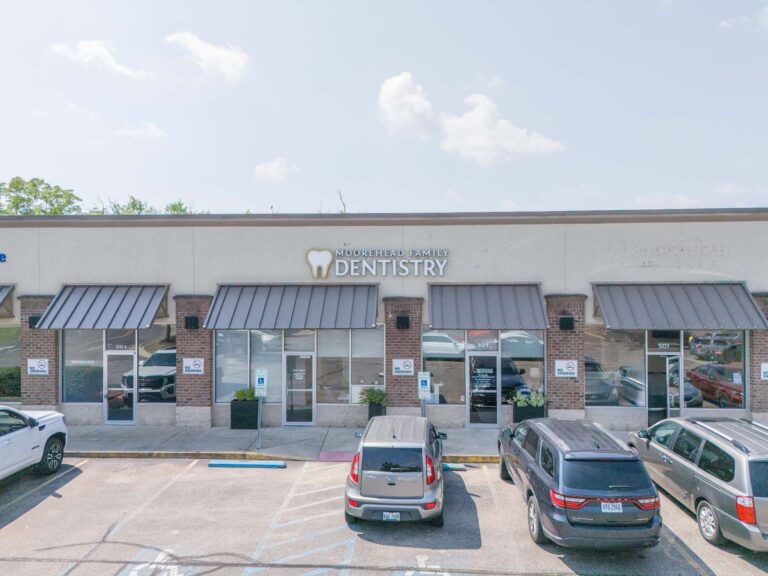How To Prevent Cavities & Tooth Decay
Preventing Cavities at Moorehead Dentistry
Cavities, often referred to as tooth decay, are tiny holes that develop in the hard surface of your teeth. They are most common in children and teenagers, but they can affect everyone including infants and toddlers. Join Moorehead Dentistry as we take a closer look at what causes cavities and how you can prevent them.
Causes of Cavities
Cavities typically occur as a result of poor oral health habits but other various factors can increase the risk of getting a cavity, including:
- Dry mouth. Dry mouth occurs when there is a lack of saliva in the mouth. Saliva helps wash away food stuck on the teeth and it counters the acid produced by bacteria in the mouth, which reduces the chance of cavities.
- Foods and drinks. Certain foods aren’t as easily washed away from saliva, making them more likely to cause decay. Foods you should limit include ice cream, honey, sugar, soda, cake, chips, cookies, and hard candy.
- Constant snacking or sipping. Drinking or eating frequently throughout the day results in increased bacteria in your mouth. These bacteria produce the acids that attack tooth enamel.
- Lack of fluoride. Fluoride is a natural mineral that helps prevent cavities and can reverse the early stage of tooth decay. Use a fluoride toothpaste and mouthwash to help reduce your chance of cavities.
Cavity Prevention
Regular dental visits and daily brushing and flossing are the best protection against cavities. But, cavities left untreated get larger and larger, affecting the deeper layers of your teeth. Deeper cavities result in higher chances of experiencing severe toothache and infection. So, when it comes to cavities, prevention is key. Below are some of our cavity prevention tips:
- Brush with fluoride toothpaste. Brush and floss twice a day, ideally after each meal.
- Visit your dentist for regular checkups and cleanings. Professional teeth cleanings remove plaque that builds up over time which isn’t removed by regular brushing and flossing. Going to the dentist twice a year is one of the best cavity prevention options.
- Dental sealants. Sealants protect the tooth enamel from harmful plaque and bacteria.
If you think that you have a cavity or are experiencing tooth decay, contact one of our three office locations immediately!
Learn More About Fillings & SealantsWhat Is The Best Teeth Whitening Option?
Achieve a Brighter Smile with Teeth Whitening
Teeth discoloration is a common concern, prompting many individuals to seek effective teeth whitening solutions. Whether you prefer at-home treatments or professional interventions, the key is to find the best option that suits your needs. Let’s delve into the world of teeth whitening and explore the available choices.
At-Home Teeth Whitening
When it comes to achieving a brighter smile, at-home teeth whitening is a popular choice. This option involves the use of over-the-counter products such as whitening strips, pens, or toothpaste.
Peroxide Bleaching Agents
- Over-the-counter solutions typically contain 3 – 20 percent peroxide.
- Results may take longer to appear compared to professional treatments.
Considerations
- At-home kits may have limitations based on your tooth color and prior dental health.
- Incorrect usage can lead to issues such as burned gums, tooth sensitivity, or pain.
Recommendation
If opting for an over-the-counter solution, ensure it carries the ADA Seal of Acceptance for a trustworthy choice.
Professional Teeth Whitening
Superiority of Professional Options
Professional teeth whitening stands out for its safety and effectiveness. Custom-made whitening trays, either for home use or in-office appointments, offer a comprehensive approach.
Peroxide Concentration
- Professional solutions boast higher peroxide concentrations, ranging from 14 – 43 percent.
- Shorter application times are necessary to prevent teeth dehydration and sensitivity.
Safety Measures
- Professional interventions ensure proper precautions are taken to protect your gums.
Making the Right Choice
The best teeth whitening option varies from person to person. Consider the following factors:
- Desired results
- Budget constraints
- Dental health history
In the pursuit of a dazzling smile, understanding your teeth whitening options is crucial. Consult with your dentist to determine the most suitable treatment for you. Whether you opt for the convenience of at-home solutions or the reliability of professional interventions, a brighter smile awaits!
Learn More About Teeth Whitening at Moorehead DentistryWhat Are the Pros and Cons of Dental Implants?
Are Dental Implants for You?
One of the hottest topics in dentistry today is the use of dental implants. Implants have certainly revolutionized the field of tooth replacement. If you are considering dental implants for missing teeth, you need to know the facts. There are pros and cons of dental implants that are carefully weighed by your dentist before surgery can be scheduled.
Research continually shows that dental implants are the best long-term solution to replace missing teeth. However, like any type of surgery, there are advantages and disadvantages.
Cons of Dental Implants
No procedure is right for everyone, including dental implants. While there are some risks associated with dental implants, they are relatively mild. The disadvantages include:
1. You have to meet a set of requirements
In order to have dental implant surgery, you first have to meet certain criteria. As the procedure involves anchoring the implant to your jaw bone, if you’ve experienced significant bone loss as a result of losing teeth, there may not be enough for the dental implant to be successful. You also have to be in good health so your jawbone can fully recover.
2. The cost of the procedure
While dental implants are the best long-term solution for tooth loss, they’re not always the most cost-effective. However, dental implants are well worth the price for the comfort, confidence, and natural feel they give you.
3. The procedure can be lengthy
Dental implants are not a quick fix and can take several months to complete. If you’re replacing an existing damaged tooth, this will first need to be removed. Your dentist will then need to prepare the tooth site before fitting the implant anchor. Once the anchor has been fitted, you’ll need to wait several months while it heals and the surrounding bone grows. The final stage of the procedure involves placing the artificial tooth.
Pros of Dental Implants
While there are some drawbacks to dental implants, the advantages far outweigh the disadvantages.
1. They look and feel like natural teeth
Dental implants have the appearance of real teeth. In fact, once your implant has been fitted, you’ll hardly be able to tell the difference between your replacement tooth and your real teeth. Implants also won’t feel any different from your regular teeth. Since the implants are anchored to your jaw, they’ll feel just as strong as your regular teeth too.
2. You can eat and chew with ease
Unlike dentures, implants won’t feel any different than your regular teeth when eating and chewing. Once the dental implant procedure is complete, you can eat what you want! Whether you fancy crunchy snacks, chewy foods, or hot or cold drinks, you can eat and drink without concern — just remember not to overdo the sugary treats.
3. Dental implants can last a lifetime
Implants are a long-lasting tooth replacement solution. You may need to replace the crowns every 10-15 years, but if you look after the implants, they can last a lifetime.
4. They’re easy to take care of
You should take care of your implants the same way you would take care of your regular teeth with daily brushing and flossing, regular dental checkups, and a healthy diet.
5. They prevent bone loss
Dental implants are anchored into your jaw, similar to your real teeth. The screw thread of the implant acts as the root of a natural tooth, so with dental implants, your jaw bone remains strong and you won’t experience bone loss.
You can see that the advantages heavily outweigh the disadvantages. Dental implants have been proven to be a great option for people who suffer from tooth loss. We always want to make our patients look and feel great, and dental implants are a great way to do that. We’re always happy to answer any questions you may have, so contact us today!
Learn More About Dental ImplantsRoot Canal Symptoms To Watch Out For
Each year, over 60 million Americans visit the dentist. Many of these visits are attributed to cavities—small holes in teeth that let bacteria in. But sometimes, other dental issues occur that require additional treatments. Root canals are considered the best option for saving a damaged tooth when an abscess is present. Below are some root canal symptoms to watch out for.
Signs You Need A Root Canal
1. Persistent Pain
Having persistent pain is one way to tell if you need a root canal. The pain might be constant, or it might go away, but it always comes back. You may feel the pain deep in the bone of your tooth, or it might be in your jaw, face, or other teeth.
Tooth pain may have other causes, such as gum disease, cavities, or an impacted tooth, but it’s always a good idea to talk with your dentist if you have tooth pain.
2. Tooth Discoloration
An infection in the pulp of your tooth can cause your tooth to become discolored. Trauma to the tooth or the breakdown of the internal tissue can damage the roots and give the tooth a grayish-black appearance. While there might be other reasons a tooth is discolored, it could be cause for a root canal so talk with your dentist!
3. Sensitivity to Heat and Cold
When your teeth start to hurt from drinking a hot cup of coffee or drinking ice water, you may need a root canal.
The pain can be just a dull feeling. It can be a sharp pain that lingers for an extended period of time, even after you’ve finished eating or drinking. If your tooth hurts when you eat or drink something hot or cold, the blood vessels and nerves in your tooth could be infected or damaged.
4. Swollen Gums
Swollen gums near a painful tooth can indicate you need a root canal. Even if the swelling comes and goes. If it’s tender or painful to the touch, please contact our office.
There also might be a pimple-like abscess on your gum, which may ooze pus from the infection of the tooth. This can give you an unpleasant taste in your mouth and make your breath smell bad.
5. A Chipped or Cracked Tooth
If you’ve chipped or cracked your tooth in an accident, in a contact sport, or by chewing on something hard, bacteria can set in and lead to inflammation and infection. Even if your tooth didn’t crack but you injured it, the injury can still cause damage to the nerves of the tooth. The nerve can become inflamed and cause pain and sensitivity, which may require root canal treatment.
These are just a few signs that you may need a root canal. If you have any of these root canal symptoms, it’s a good idea to talk with your dentist—contact us and we can talk you through possible solutions.
Learn More About Root Canal Treatment



